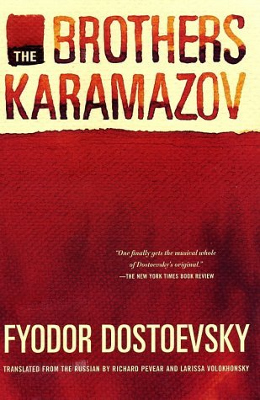“The Brothers Karamazov” Book VII

Welcome back to the summer readalong of Dostoevsky’s The Brothers Karamazov. This week we read the pleasantly short Book VII, about our hero Alyosha.
Ch 1: The odor of corruption. Alas, Zosimas sh1t smells like anyone else’s when it leaves his body after death. Many are saddened that his body did not decay in a miracle manner. But many are gleeful, schadenfreud-ishly exulting in his crude humanity. This includes the Obdorsk monk and the crazy Father Ferapont.
One of those modern glimmers that spooks me a little: a monk confessed once to Zosima that he was seeing unclean spirits. Z advised prayer and fasting but when that did not help, he advised “a certain medicine.” (335) which sounds awfully modern to me.
Alyosha leaves the monsastery.
Ch 2: An Opportune Moment. The narrator goes on about Alyosha and how he is troubled, but has not lost faith. The intrusion of the narrator is interesting, and bears further reflection for me. Rakitin finds A face down on the ground, tempts him with a sausage (”sausage”? coded language?) then takes him to Grushenka’s.
Ch3: An Onion. Alas, for an editor, here! Is Grushenka’s benefactor/savior/old man alive or dead? Hard to tell from this chapter. A few footnotes would’ve helped, or a more clear translation, or something, because his name is revealed as Samsonov on 343, then on 344 he’s called a great businessman (now long deceased). P 345 talks about his wwill, and when he had one foot in the grave and was amused by FP’s infatuation with her, but then not so amused by Dmitri’s, and advised her to avoid the latter and string along the former and get in HIS will, and then Samsonov died five months after giving this advice.
But then he’s alive and perhaps well on 344 (gah!) because Grushenka has lied to Dmitri that she’s spending the night doing business (”business”?) with Kuzma Kuzmich, who is Samsonov. WHAT? The author/translators could have made it more clear that, in what I think I grasp, that K Samsonov is alive when Alyosha goes to see her, but will not be for long, and will be long deceased by the time the narrator is telling the story. Poorly done, author/translstors/editor, poorly done.
At Grushenka’s, it comes out that G begged R to bring A many times before, as they both, for different reason, want G to seduce him. (So Rakitin’s a pimp. But a monk. Not a good guy.) A is not aroused when G sits on his lap, and she jumps off when she learns his elder is dead and he’s grieving. He sees this as an act of kindness from her, like the giving of an onion in a fable. She is leaving to be with the soldier who disgraced her years ago, and tells A to pass on to Dmitri that she loved him for an hour, and to never forget her. A real prize, no?
He returns to the monastery and the place with Zosima’s corpse and has a dream/vision that merges Zosima talking to him with the tale of Jesus’ first miracle, the turning of water to wine at the wedding of Cana. (Note that this first miracle was an occasion of joy, a wedding, not one of sorrow, like curing or revivifying someone.) He falls to the ground outside in rapture, in contrast to when Rakitin found him in Chapter 1 of this Book, and three days later leaves the monastery.
Once again, the narrator has teased but withheld the terrible event. We’re nearly halfway through the book. Maybe in Book 8, next week?
[Book 8, annoyingly, begins prior to the events of Book 7, and has to do with Grushenka and her old man Kuzma Samsonov, who is not yet dead. I was annoyed by the confusion of the order of events. This is a very muddled middle, IMO.]
What did everyone else think? Were you as annoyed as I was by the dead/not dead and out of sequence transitions between 7 and the next book, 8?
July 15th, 2013 at 7:34 pm
I admit to some very juvenile chuckles about the elder’s stinkiness. But yes, the muddled transition between 7 and 8 is frustrating.
July 20th, 2013 at 6:38 am
I liked the story of the onion a lot, and this was from a previous section, but I loved Zosima’s defense of monastic life and read it aloud to my sweetheart. In general I find the scenes in the monastery so much more straightforward and rich than any scenes in town, with confusion over money and love. I guess those are the challenges of secular living.